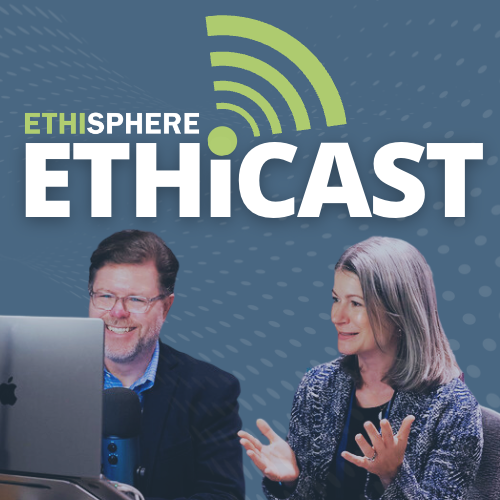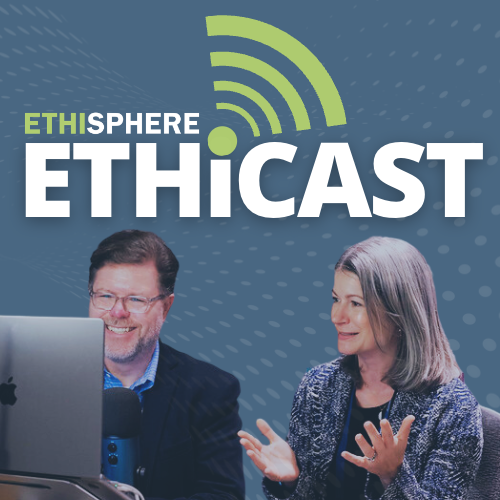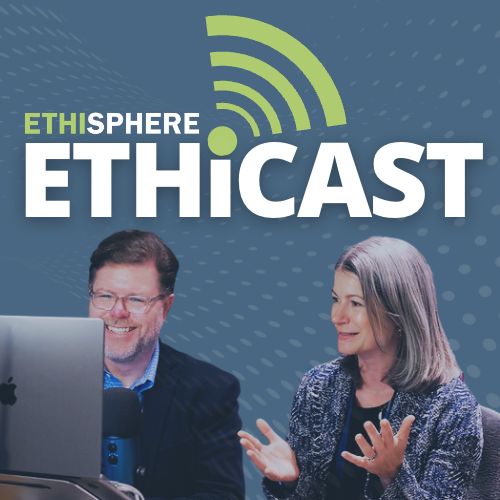Episode Transcript
[00:00:00] Speaker A: Hi everyone. Today we'll talk about how organizations can better train and communicate with their employees to drive ethical culture, especially when it comes to frontline managers. I'm your host Bill Coffin and this is the Ethicast.
Great training and communication is at the heart of a high performing ethics and compliance program, especially when it comes to equipping frontline managers to handle day to day blocking and tackling around E and C issues and to being the fulcrum of an ethical workplace culture. And yet many organizations really struggle with this, relying on training methods that are outdated, work intensive, ineffective or just plain cringy. Thankfully, it doesn't have to be that way. We are in the midst of an amazing leap forward when it comes to how we approach training, how training can inform culture and how culture can drive the business integrity that yields higher levels of sustainable performance and and success.
Joining us today to talk about this are Roxanne Petraeus and Susan Divers. Roxanne is CEO of Athena, a compliance training company that covers preventing harassment and discrimination, cyber security and data privacy, codes of conduct, dei, workplace health and safety management skills and more. Athena's library of more than 150 customizable course modules and tech includes a built in employee hotline, HR case manager and phishing simulator to help companies identify risks and tailor their training to them.
Susan serves as an advisor to Athena, drawing upon her extensive experience as an ethics and compliance practitioner and thought leader. Previously, Susan was the Director of Thought Leadership and best practices for LRN Corporation and AECOM's assistant general for Global Ethics and Compliance and Chief Ethics and Compliance Officer. Roxanne and Susan, thank you so much for appearing on today's program.
[00:01:55] Speaker B: Thanks for having us.
[00:01:56] Speaker C: It's a pleasure to work with you again.
[00:01:58] Speaker A: Bill, Given the business environment that we're in right now, do you sense any changing perceptions around the importance we place on frontline managers as critical arbiters of organizational culture?
[00:02:08] Speaker B: This is one of the most frequent conversations that I'm having with Athena customers. Compliance, compliance leaders. They're very concerned that maybe some of the headlines are being interpreted by managers, but junior employees, by, you know, really anybody to me that there's been a shift in terms of the importance of ethics, the importance of doing business the right way. And so yes, I do think it's, it's reasonable to think about, take the pause in FCPA enforcement for example. I'm sure many of your listeners, Bill, are compliance practitioners. They understand the nuance behind that. They understand concepts like statute of limitations and you know, all of that. If you're just a junior employee entering a large organization, you might just breeze past a headline and, you know, kind of walk away thinking, okay, bribery, that's okay now. Or. And so I do talk with a lot of leaders who want to use this time to really double down on why values matter. They're maybe not going to use terms like ethics or compliance as much, but instead, hey, doing business the right way is still crucial for our organization. Let's point to our values. None of that has changed. I really see a very concerted effort to maybe do almost a little bit more given, you know, it's, it's a pretty tumultuous times.
[00:03:26] Speaker C: I think it's another example of why training is so incredibly important. If you've got all this dust in the air and people are saying, well, what does this mean?
What are we doing with, with bribery? What are we doing with other areas? Dei, for example, good training is basically designed to give people the tools to navigate when they're in the middle of the dust storm. I think it's a perfect occasion to reaffirm what the rules of the road are because those really haven't changed. As Roxanne noted, I would urge people to revisit and think about how they're actually using training and instead of just a one and done yearly thing, really deploy it to help employees find their way in the dust cloud.
[00:04:15] Speaker A: How can organizations best communicate to their employees and their people, managers, the values by which they operate, by which they serve their stakeholders, and by which they come together as a culture themselves? This is an area where it seems that flexibility and agility have become increasingly important.
[00:04:32] Speaker B: Yeah, one of, I was just doing a event with one of our great customers and he had talked about how he has really incorporated messages from leadership, from his company's leadership into all aspects of training. We were talking about code of conduct training, for example. And I know, you know, historically it's been common. Maybe you have the CEO kickoff message from CEO kickoff training. But what this customer did is really grab each business unit leader. So grab someone from sales to put them in the anti bribery component or the side letters component. You know, take someone from maybe HR and put them in the inclusion component. And I thought that that was one way to really drive home that average employee who doesn't spend 95% of their day thinking about compliance, that maybe terms like compliance are abstract, but seeing my sales leader, you know, my engineering leader talk about why data privacy is important to our organization, I think is so much more powerful. Like Susan, you know, mentioned this really Having kind of generic messaging like, doesn't hammer home why this is important for our company. And so the more specific a company can get in terms of their values, their leaders, even particular incidents that have happened at their company recently, you know, of course, like sufficiently anonymized, I think really makes it sing for an employee. A long time ago I was a junior officer in the United States army and I think kind of like messages from the Pentagon always felt very abstract, very like sort of seeing a poster on a wall, like it didn't feel like it, it impacted my day to day. But what did impact my day to day was my specific frontline commander and with that person both said, but way more importantly actually did kind of told me what is the worst behavior this organization is willing to tolerate and where does this organization draw a line? So I think in, in addition to making it really tailored and specific to the company, I think really getting the buy in of managers and making sure, you know, I'm a parent, you can see my child's artwork behind me is I think parents and employees, like, we're not very, very different in that we pay so much more attention to what someone does than what they say. And so I think just like really as a LXC compliance professional, remembering that your, your managers are almost like 24 7, 365 training and that they're walking around really embodying your values.
[00:06:50] Speaker C: Yeah. And I love what the way you, you phrased it and teed it up, Roxanne. And it reminds me of something you said a couple of months ago, that if your training looks schlocky or like canned soup, you know, it sends a message. No matter what the content is, it means that it's not that important.
And if you look, I took a step back a couple of days ago just to sort of look at the evolution of training over the course of ethics and compliance. And it's definitely come to the point where if you don't have customization and you don't, as Roxanne was saying, use things that really happen to you. I mean, you clean them up. You don't say, and then the CEO took abroad or whatever, then it speaks to people and it engages them. And if you target it correctly at the people who are at highest risk, you're basically giving them the tools or the GPS to stick with the earlier analogy to get out of the dust storm.
But it has to be really good training. And one of the joys of working at Athena is customization is a big part of what Athena helps people do very easily.
And a lot of the industry is going in the opposite direction. The canned soup, if you will.
[00:08:11] Speaker A: As you mentioned, when it comes to training, we often talk about how one size does not fit all. But what advice can you give organizations that struggle with crafting training experiences that really meet their specific needs, that faithfully communicate their cultural values, and I guess most of all, meaningfully connect with their codes of ethics and conduct?
[00:08:30] Speaker C: One of the things that we just touched on is the customization and actually using things that really happened. And as I look back, I wish I had done more of that when I was running a program and more of that in the sense of highlighting positive things that have happened, not just the near air disasters.
And one example is we had a manager who repeatedly turned down a sole source contract that would have been incredibly lucrative because it was tainted and we didn't really know who our partner was going to be. We had suspicions that there was a circle going back to the customer and being able to highlight an example like that easily.
And again, using customization, using video.
Another key thing that we do at Athena is use a lot of video to get points across which, welcome to the 21st century. Making it very fresh, very relevant, and keeping it updated. That's not hard now to do.
[00:09:41] Speaker B: One thing that we're incredibly excited about, and I'll actually be doing a live demo of at Ethispheres GS next week, is the AI tools have made that customization like as good as Athena did it, you know, five years ago. It's now so much better. So it's really incredible how you can take almost like a base piece of content. And what we, Athena are doing is leveraging AI internally to make, for example, like let's say you have a component of your code of conduct, but you maybe are an organization that has some manufacturing, you've also got some corporate. And you realize that they really do need this scenario to be different. They want the background to look like it's in their office place.
Now with these great tools, we can make a video in two versions. And then our great tech means that as a compliance officer, you're not trying to make sure that you are almost managing this massive database of files, making sure file A goes to Bill and file B goes to Susan. Like that's what we handle. Another example where it's gotten phenomenal is language translation, right? So like, you as an employee should be receiving the content in the language that you're most comfortable learning in. And that language translation should be very high quality. And So I think that while, you know, I completely understand, Susan, when you were running a program, there must have been a lot of reasons why it was very difficult to make all of those tweaks that probably in some ideal world you would have done. Now it really is possible. And I think a vendor should absolutely be supporting a compliance leader in their vision of highly personalized, highly tailored training.
[00:11:10] Speaker C: Training has to work well.
If you, you know, roll out training in your company and it's, it's glitchy or it's cringy, to use one of Bill's famous words, you're going to hear about it and it's going to destroy a lot of goodwill and it's going to convince people that this is a painful experience that they want to try to avoid if they can. So having it be really high quality, having the technical backup, which we're lucky enough to have, that too, at Athena, I think it's a point that people sometimes forget.
[00:11:44] Speaker A: Well, Roxanne and Susan, thank you so much for joining us on today's episode. The work that you're doing to advance ethics and compliance training is an important piece of how we all move business integrity forward together.
[00:11:54] Speaker B: Thank you so much for having us.
[00:11:56] Speaker C: Thanks, Phil.
[00:11:57] Speaker A: In March, Ethisphere and Athena partnered to build a new course entitled Ethical Management which is designed specifically for mid level managers to help them understand their role in promoting integrity, encouraging a speak up culture and making ethical decisions in real world scenarios. The course features customizable training content, multiple languages and accessibility, flexible delivery and more. To learn all about it, please visit goathena.com thanks for joining us. We hope you've enjoyed the show. For new episodes each week, be sure to subscribe on YouTube, Apple Podcasts and Spotify. And until next time, remember, strong ethics is good business.


